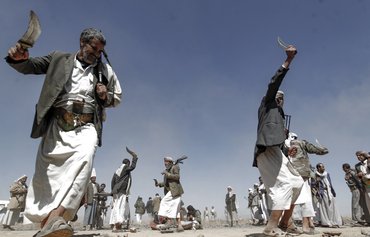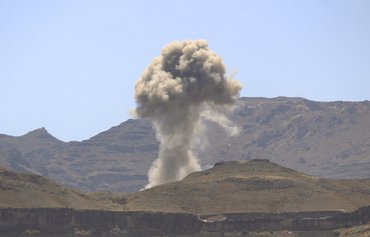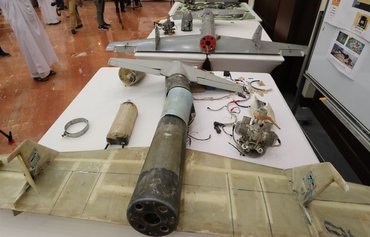Yemen's government and the UN have condemned a barrage of weekend missile attacks on Saudi Arabia carried out by the Iran-backed Houthis (Ansarallah).
They described the attacks as a military escalation, and an attempt to undermine the UN's call for a ceasefire to confront the novel coronavirus (COVID-19) pandemic.
"Saudi air defences on Saturday night (March 28th) intercepted two ballistic missiles launched by the Iran-backed Houthis in Yemen towards the capital, Riyadh, and the southern city of Jizan," said Arab coalition spokesman Col. Turki al-Maliki.
"Two civilians were slightly injured by falling debris from an intercepted missile as it exploded in mid-air over a residential area in Riyadh," he said.
The Houthis claimed responsibility around 15 hours after the attacks, AFP reported, with a spokesman for the militia calling it "the largest operation of its kind" as Yemen's war enters its sixth year.
The coalition on Monday said it carried out multiple airstrikes on Houthi-held Sanaa in retaliation for the missile strikes on Riyadh.
The operation was aimed at destroying "legitimate military targets" including Houthi ballistic capabilities which "threaten civilian lives", the coalition said in a statement released by the official Saudi Press Agency.
The Houthi-run Al-Masirah television reported at least 19 airstrikes on a number of targets in Sanaa, including military bases and a military academy.
In a Sunday statement, UN special envoy to Yemen Martin Griffiths expressed deep alarm over the continuation and escalation of ground and aerial military activities in Yemen.
"I am gravely dismayed and disappointed by these actions at a time when the Yemeni public's demands for peace are unanimous and louder than ever before," he said.
"Yemen needs its leaders to focus every minute of their time on averting and mitigating the potentially disastrous consequences of a COVID-19 outbreak," he added, noting that indiscriminate attacks affecting civilians or civilian targets, whether inside or outside of Yemen, are unlawful and reprehensible.
Houthis show 'no desire for peace'
In a statement carried by local media, the Yemeni government condemned the Houthis' "terrorist attack" on Saudi Arabia, saying this shows the Iran-backed militia "has no desire for peace" and does not have the will to end the crisis.
"Their decision is not in their hands," the government added, pointing to the overriding influence of Iran.
The attack on the kingdom is a "terrorist, failed attack carried out by Iran's mercenaries", Yemeni Information Minister Muammar al-Eryani told local media. "This attack confirms that Iranian weapons continue to flow to the Houthis."
Abaad Centre for Strategic Studies head Abdul Salam Mohammed told Al-Mashareq the Houthis had at first backed the UN's call for a ceasefire, along with the Yemeni government and the Arab coalition.
"But when their plan to storm Marib failed on the ground, they escalated the situation by launching missiles on Saudi Arabia," he said.
"The Houthis understand very well that the world is preoccupied with its fight against the coronavirus pandemic, and want to expand the circle of their control as soon as possible," Mohammed said.
Fighting has also escalated between the Houthis and Yemeni troops around the strategic northern districts of al-Jawf and Marib, AFP reported.
The Houthis stormed a key governmental military camp in al-Jawf after heavy clashes on Monday, according to Yemeni military sources.
Saudi Arabia under threat from attack
"Saudi Arabia's announcement that it intercepted a missile in mid-air over Riyadh shows that the Saudi capital itself, not just the border cities, has now fallen within the range of Houthi missiles," Mohammed said.
He described this as a "dangerous development, as it poses a threat to the security of the entire Gulf region, and not just Saudi Arabia".
"The Houthis are an armed group that has imposed their control with violence and weapons, and their authority cannot be established without war," he noted. "Therefore they will proceed with their offensive on Marib."
The militia "will not give in to peace unless they suffer a major military defeat, such as losing one of the provinces they are now controlling", he added. "In this case, they will be forced to look for peace, or at least stop their escalation."
The Houthis' escalation and their attack on Saudi soil will cost all parties the opportunity to achieve peace in a way that would enable all of them to save face, political analyst Faisal Ahmed told Al-Mashareq.
Moreover, he said, "the coronavirus requires redoubled efforts even in advanced countries, so unifying the efforts of all parties to the conflict in Yemen and preparing to confront the virus must be the priority for all".
"If the coronavirus spreads in Yemen, it will be a catastrophe on an unimaginable scale, because the health infrastructure in the country has been destroyed five years into the war," he added.

![In this file photo taken February 20th, a Patriot missile battery is seen near Prince Sultan airbase at al-Kharj south of Riyadh. Saudi air defences intercepted ballistic missiles fired by the Houthis over Riyadh and Jizan on March 28th. [Andrew Caballero-Reynolds/POOL/AFP]](/cnmi_am/images/2020/03/30/23287-Sudi-patriot-missile-600_384.jpg)






